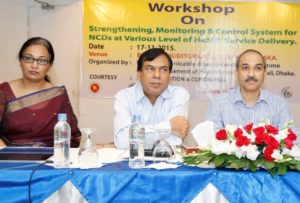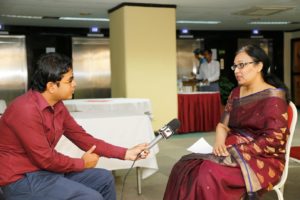A bold media strategy targeting top TV and print journalists has allowed our ARK Foundation partners to reach millions with their message about better prevention and treatment of non-communicable diseases (NCDs) in Bangladesh.
Strong lifestyle messages about unhealthy food habits, low levels of physical activity, smoking and pollution were at the centre of ARK’s recent national workshop on NCDs and helped secure prominent TV coverage for the event across Bangladesh’s three main news channels, as well as wide coverage in the top-rated newspapers and their online versions.
The event, however, went beyond public health headlines and started a national dialogue on the practical service delivery steps that will help Bangladesh reduce the personal, social and economic impact of NCDs. Currently, NCDs, such as cardiovascular disease and diabetes, are responsible for more than 60% of Bangladesh’s annual mortality and account for 60% of the country’s disease burden (measured by financial cost and years of quality life lost).
The event was co-hosted by ARK and the Non-Communicable Disease Control (NCDC) Unit of the Directorate General of Health Services (DGHS). More than 60 participants from all levels of the health service, including delegates from the World Health Organization, came together to share ideas on how to improve prevention, diagnosis and treatment of NCDs in primary care.
According to Dr Rumana Huque, Executive Director of ARK, a key factor in the success of the event was the decision to include managers from every level of the health service.
‘The participants were diverse and that was very important. We had local level healthcare managers who have the practical knowledge of what is happening on the ground to control and treat NCDs. But we also had mid-level programme managers who support them and the senior-level policymakers who take the final decisions.
‘So what came out at the workshop were the challenges that service providers are already facing and the recommendations that we have generated through or work at ARK.
‘Through our research we know that we need more counselling for NCD patients, better training for doctors and health providers, a better supply of medications, improved record keeping and stronger referral links between different parts of the health service.’
Dr Huque, who is part of the core team drafting the Sector Programme – the strategic investment programme for the next five years – added that workshop had been very timely.
‘The workshop helped everyone focus on the priorities; specifically improved NCD services and better lifestyle education. Senior managers and policy makers took note and said that they would be feeding what they had learned into the next Sector Programme.’
Giving the keynote speech at the workshop, Professor Dr Abul Kalam Azad, DGHS Additional Director General (Planning and Development), told delegates that NCDs are responsible for 62% of deaths happening every year in Bangladesh.

Key speakers at ARK’s national NCD workshop. From left: Dr Rumana Huque, Executive Director of ARK, Prof Dr Abul Kalam Azad, DGHS Additional Director General (Planning and Development), Prof Dr Enayet Hussain, NCDC Unit Line Director
He said that Bangladesh had not placed sufficient importance on NCDs, with catastrophic results in terms of premature mortality.
As part the COMDIS-HSD programme, ARK has been working with primary health care facilities in Bangladesh to establish better screening, treatment and referral processes for people with NCDs. Their experience and research findings were fed into group discussions to identify urgent actions that will help Bangladesh achieve its Sustainable Development Goal target of reducing NCD premature mortality by one third by 2030. These include the more timely supply of medicines, a wider range of medicines and dedicated doctors and health educators in ‘NCD corners’ in district hospitals.
Find out more:


